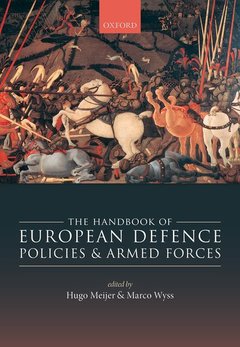Description
The Handbook of European Defence Policies and Armed Forces
Coordinators: Meijer Hugo, Wyss Marco
Language: English
Subject for The Handbook of European Defence Policies and Armed Forces:
Publication date: 07-2018
1008 p. · 17.8x25.4 cm · Hardback
1008 p. · 17.8x25.4 cm · Hardback
Description
/li>Biography
/li>
The armed forces of Europe have undergone a dramatic transformation since the collapse of the Soviet Union. The Handbook of European Defence Policies and Armed Forces provides the first comprehensive analysis of national security and defence policies, strategies, doctrines, capabilities, and military operations, as well as the alliances and partnerships of European armed forces in response to the security challenges Europe has faced since the end of the cold war. A truly cross-European comparison of the evolution of national defence policies and armed forces remains a notable blind spot in the existing literature. The Handbook of European Defence Policies and Armed Forces aims to fill this gap with fifty-one contributions on European defence and international security from around the world. The six parts focus on: country-based assessments of the evolution of the national defence policies of Europe's major, medium, and lesser powers since the end of the cold war; the alliances and security partnerships developed by European states to cooperate in the provision of national security; the security challenges faced by European states and their armed forces, ranging from interstate through intra-state and transnational; the national security strategies and doctrines developed in response to these challenges; the military capabilities, and the underlying defence and technological industrial base, brought to bear to support national strategies and doctrines; and, finally, the national or multilateral military operations by European armed forces. The contributions to The Handbook collectively demonstrate the fruitfulness of giving analytical precedence back to the comparative study of national defence policies and armed forces across Europe.
Hugo Meijer is Marie Skłodowska-Curie Fellow at the Robert Schuman Centre for Advanced Studies, European University Institute, and the Academic Director of the European Initiative on Security Studies (EISS). His publications include Trading with the Enemy: : the Making of US Export Control Policy toward the People's Republic of China (OUP, 2016), and Origins and Evolution of the US Rebalance toward Asia: Diplomatic, Military, and Economic Dimensions (Editor, Palgrave Macmillan, 2015). He has also published in such journals as the Journal of Strategic Studies, European Journal of International Security and the Journal of Cold War Studies. Marco Wyss is Lecturer in the International History of the Cold War at Lancaster University, an Associate Fellow at the Institute of Commonwealth Studies, and a Fellow of the Royal Historical Society. He is co-editor of the 'New Perspectives on the Cold War' book series (Brill), and the editor of the International Journal of Military History and Historiography. His publications include Arms Transfers, Neutrality and Britain's Role in the Cold War (Brill, 2013), Peacekeeping in Africa (co-authored wtih Thierry Tardy, Routledge, 2014), and Neutrality and Neutralism in the Global Cold War (Routledge, 2016). His articles have been published in such journals as the Journal of Contemporary History, International History Review, Journal of Imperial and Commonwealth History, Cold War History, and the RUSI Journal.
© 2024 LAVOISIER S.A.S.




